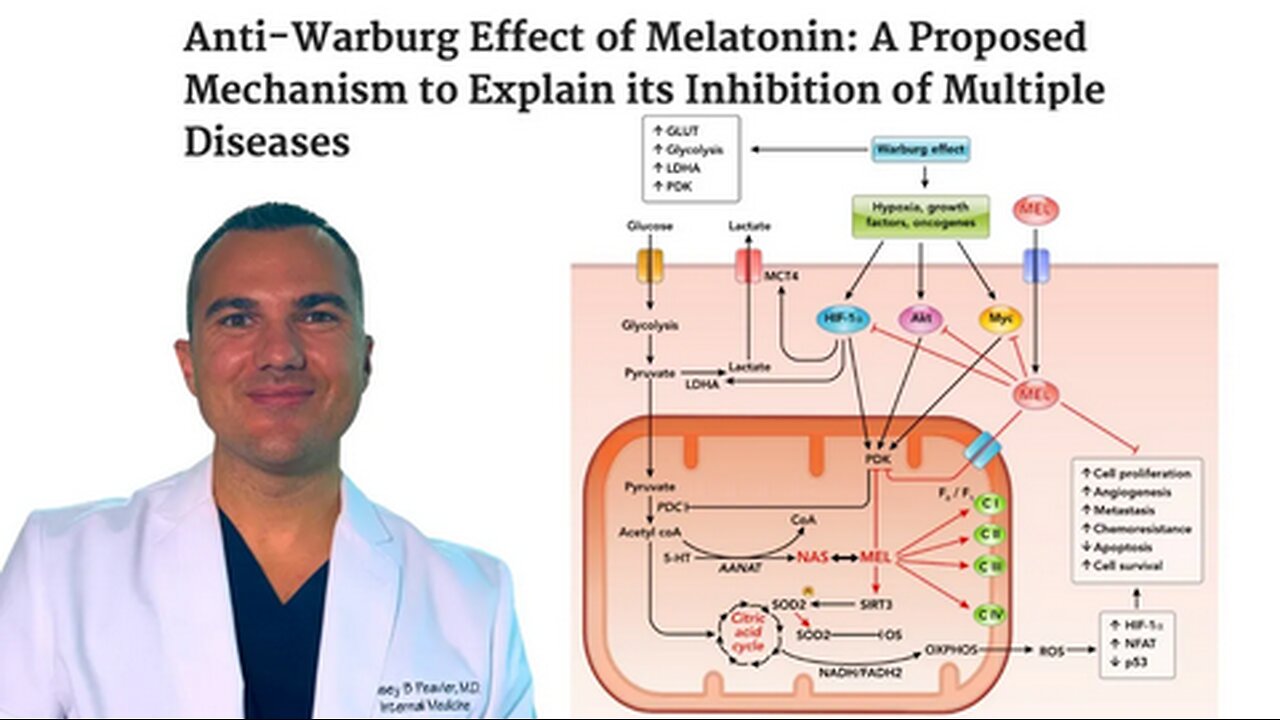Premium Only Content

Melatonin KILLS Cancer: REVERSES Warburg Effect & INHIBITS Glucose
https://pmc.ncbi.nlm.nih.gov/articles/PMC11104865/
Melatonin inhibits Warburg-dependent cancer by redirecting glucose oxidation to the mitochondria: a mechanistic hypothesis
Melatonin has the ability to intervene in the initiation, progression and metastasis of some experimental cancers. A large variety of potential mechanisms have been advanced to describe the metabolic and molecular events associated with melatonin’s interactions with cancer cells. There is one metabolic perturbation that is common to a large number of solid tumors and accounts for the ability of cancer cells to actively proliferate, avoid apoptosis, and readily metastasize, i.e., they use cytosolic aerobic glycolysis (the Warburg effect) to rapidly generate the necessary ATP required for the high metabolic demands of the cancer cells. There are several drugs, referred to as glycolytic agents, that cause cancer cells to abandon aerobic glycolysis and shift to the more conventional mitochondrial oxidative phosphorylation for ATP synthesis as in normal cells. In doing so, glycolytic agents also inhibit cancer growth. Herein, we hypothesize that melatonin also functions as an inhibitor of cytosolic glycolysis in cancer cells using mechanisms, i.e., downregulation of the enzyme (pyruvate dehydrogenase kinase) that interferes with the conversion of pyruvate to acetyl CoA in the mitochondria, as do other glycolytic drugs. In doing so, melatonin halts the proliferative activity of cancer cells, reduces their metastatic potential and causes them to more readily undergo apoptosis. This hypothesis is discussed in relation to the previously published reports. Whereas melatonin is synthesized in the mitochondria of normal cells, we hypothesize that this synthetic capability is not present in cancer cell mitochondria because of the depressed acetyl CoA; acetyl CoA is necessary for the rate limiting enzyme in melatonin synthesis, arylalkylamine-N-acetyltransferase. Finally, the ability of melatonin to switch glucose oxidation from the cytosol to the mitochondria also explains how tumors that become resistant to conventional chemotherapies are re-sensitized to the same treatment when melatonin is applied.
VIDEO source: https://www.youtube.com/watch?v=h4j5aZBXMgg
-
 LIVE
LIVE
cbsking757
4 hours ago★TANKING RIVALS RANKED! GIFTED SUBS ARE LIVE! #marvel #marvelrivals
157 watching -
 4:04:55
4:04:55
Tate Speech by Andrew Tate
11 hours agoEMERGENCY MEETING EPISODE 99 - 2024 - TIME VACUUM
189K105 -
 26:14
26:14
Breaking Points
4 hours agoSH*TSHOW: FBI Retracts False Info on NOLA Attacker
39.8K29 -
 56:35
56:35
The Dan Bongino Show
6 hours agoReprise: Best Episode Of 2024 - 01/02/2025
246K1.24K -
 16:04
16:04
Tundra Tactical
2 days ago $1.05 earnedHow Palmetto State Armory got so BIG!
18.2K2 -
 25:19
25:19
Feeding the Byrds
4 hours ago3 EASY DINNERS for a BUSY week! | Easy dinner inspiration
17.4K -
 6:44
6:44
SLS - Street League Skateboarding
7 days agoYuto Horigome’s 2nd Place Finish at SLS Tokyo 2024 | Best Tricks
41.2K2 -
 LIVE
LIVE
hambinooo
6 hours agoTarkov Thursday
305 watching -
 2:22:31
2:22:31
The Kirk Minihane Show
8 hours agoKMS LIVE | January 2, 2025 - ft. Blind Mike & Beer Stud
70.1K3 -
 46:12
46:12
Grant Stinchfield
1 day ago $4.01 earnedWhere is DOGE When You Need it? Billions Wasted, Newsom Smiles!
33.9K15